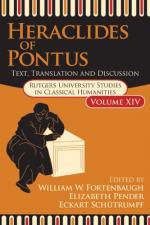|
This section contains 401 words (approx. 2 pages at 300 words per page) |
Encyclopedia of World Biography on Heraclides of Pontus
The Greek philosopher Heraclides of Pontus (ca. 388-310 BC) proposed the theory that the apparent daily revolution of the fixed stars is in fact due to the actual daily rotation of the earth about its own axis.
Born at Heracleia in Pontus, the son of the wealthy Euthyphron, Heraclides was a descendant of one of the founders of Heracleia. He was probably forced to leave in 364/363 B.C. because of the tyranny of Clearchus and went to Athens to study under Plato at the Academy. He was left in charge of the Academy when Plato went to Sicily in 360 B.C. He later studied under Aristotle, but, when a successor to Speusippus was elected in 339 B.C., his candidacy was defeated by Xenocrates and he returned to Pontus.
Heraclides was a most prolific writer, composing dialogues on ethics, natural science, literary criticism, music, rhetoric, and the history of philosophy. However, his works are now known only through some quotations by later writers. His most interesting theories are those in astronomy. Contradicting the Platonic and Aristotelian doctrine that the earth must stand still, he hypothesized that it rotates once daily on its own axis. On this assumption he was free to assert as a corollary that the universe is infinite, then to speculate on the existence of other earths in the stellar systems that appear to be fixed stars. This daring theory could not explain as much about motion as did Aristotle's and therefore was regarded merely as an oddity.
Heraclides also possibly indicated, in one fragment which can be otherwise interpreted, that he believed that Venus and Mercury revolve around the sun, a theory also contrary to Aristotelian physics. This deduction, if his, was probably due only to the identity of the sidereal periods of the sun and the two inferior planets, as these sidereal periods were the common criteria for determining the order of the planetary spheres. It is not an adumbration of the planetary system advocated by Tycho Brahe in the 16th century. Another theory doubtfully attributed to Heraclides is that the apparent anomalous motion of the sun can be explained as well by the earth's revolving about the sun as by the sun's about the earth. The mathematical identity of the geocentric and heliocentric systems, however, is irrelevant to the problem of anomalous motion, and the meaning of the fragment is thereby rendered very dubious indeed.
|
This section contains 401 words (approx. 2 pages at 300 words per page) |


